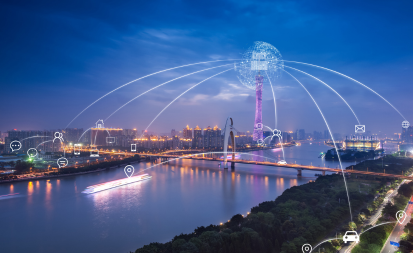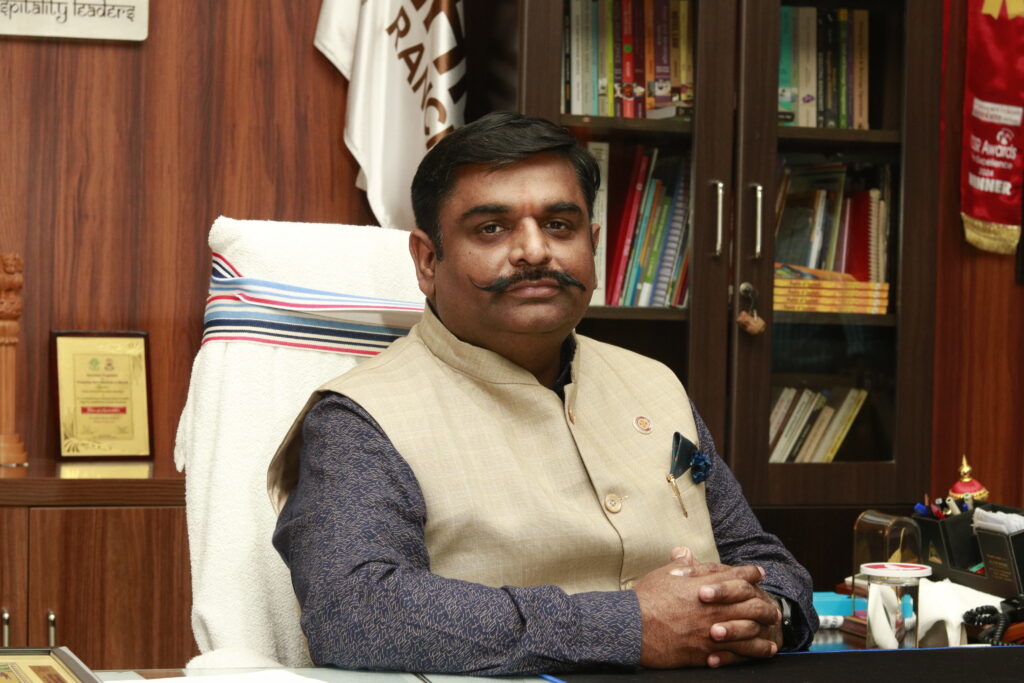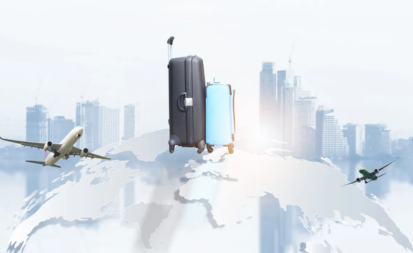The Role of Artificial Intelligence in Advancing Sustainable Travel in India
Discover insights from industry experts on how artificial intelligence is transforming sustainable travel in India. Explore innovative solutions for a greener future


Raoof Dhanani
Managing Director, Sayaji Hotels Ltd.
“Artificial Intelligence (AI) is pivotal in advancing sustainable travel in India by driving resource optimization and operational efficiency in the tourism sector. AI can help hotels and resorts minimize their ecological footprint by optimizing energy and water usage, reducing waste, and predicting peak tourist seasons. This ensures that tourism infrastructure operates sustainably while catering to growing demand. AI’s ability to analyze vast data on tourist behavior and resource consumption provides critical insights for enhancing sustainability efforts. It enables stakeholders to make data-driven decisions that align tourism growth with environmental conservation. Furthermore, AI enhances the travel experience by offering personalized, eco-friendly recommendations, and promoting responsible tourism choices among travelers.
AI’s real-time monitoring capabilities allow for proactive management of environmental indicators such as pollution and resource depletion, enabling timely interventions to protect fragile ecosystems. Economically, AI integration in sustainable tourism practices can lead to significant cost savings and operational efficiencies, fostering a balanced approach to growth. While challenges such as infrastructure limitations and the need for skilled personnel persist, the long-term benefits of AI in transforming India’s tourism sector into a sustainable industry are undeniable. With strategic implementation, AI presents immense opportunities for creating a greener, more responsible travel experience.”
Mehul Sharma,
Founder & CEO, Signum Hotels and Resorts.
Artificial intelligence (AI) is playing a pivotal role in promoting sustainable travel in India, a country known for its diverse ecosystems and rich cultural heritage. AI-driven platforms are enhancing traveler experiences while minimizing environmental impact. By analyzing vast amounts of data, AI can optimize travel routes, recommend eco-friendly accommodations, and offer personalized travel itineraries that prioritize sustainability. Additionally, AI-powered chatbots and virtual assistants are helping travelers make informed decisions, reducing the carbon footprint associated with traditional travel planning. In India, where sustainable tourism is gaining momentum, AI is aiding in the development of smart cities and green transportation networks, further supporting eco-friendly travel. Furthermore, AI-driven monitoring systems are being used to preserve wildlife and natural habitats, ensuring that tourism growth does not come at the cost of the environment. By integrating AI into the travel industry, India is positioning itself as a leader in sustainable tourism, balancing economic growth with environmental stewardship.


Rakshit Sharma
COO – The Machan
Artificial Intelligence (AI) is playing a transformative role in advancing sustainable travel in India by revolutionizing key aspects of the travel and tourism industry.
One of AI’s major contributions is enhancing customer experience through personalized services. AI-powered tools such as recommendation systems, virtual assistants, and language translation services analyze large datasets to suggest tailored destinations, accommodations, and activities. This not only enriches the travel experience but also facilitates smoother interactions across diverse languages and cultures. AI is contributing to the optimization of energy usage in Hotels & Resorts by regulating lighting, heating, and cooling systems in accordance with occupancy levels and prevailing weather conditions.
Chatbots and virtual assistants powered by artificial intelligence are capable of delivering real time information regarding local sustainability efforts, environmentally friendly stays, and sustainable transportation alternatives.
In terms of operational efficiency, AI is helping the travel sector optimize traffic patterns, reduce congestion, and support environmental sustainability. By streamlining operations, AI enables companies to manage resources efficiently, ensuring energy conservation and minimizing waste. AI is also driving the creation of new business models in the industry. Dynamic pricing, predictive analytics for demand forecasting, and personalized marketing strategies powered by AI allow companies to innovate and improve their performance.
At The Machan Resorts, AI is being used to up the ante by offering personalized guest experiences, enhancing operational efficiency, and promoting sustainability initiatives. By leveraging AI-driven data analysis and customer preferences, The Machan tailors its offerings to ensure a memorable and eco-friendly stay.
Through these innovations, AI is making travel more efficient, customer-centric, and sustainable, aligning with India’s goals for responsible tourism.
Murlidhar Rao,
Chief Operating Officer, Araiya Hotels & Resorts
The entire world and human ecosystem is on the verge of transformation, in some cases, very radical, to reduce the carbon footprint; to sustainable practices to explore the world and travel; to preserving the natural and cultural habitats for the future generations.
With the resurgence of enhanced smart handheld devices and tethered accessories such as smart eye glasses and smart wrist devices, we are now able to harness not only data but also analytics on subjects which improve destination management.
AI related technology and Machine Learning algorithms improve the conservation of resources, effective inventory management and control, and optimise fuel, energy and water consumption in operations.
Travel agencies, OTAs and consolidators are also using AI enhanced chatbots to optimise the guest itinerary to manage both the guest preferences and optimal travel arrangements, to reduce the carbon footprint.
There has been an increased awareness in the general demographics, for ESG practices, and the enhanced AI tools correlate data that is available for the destination and the resort, to allow guests to make informed choices, and in some cases, pay a premium for the ESG endeavour.
We at Araiya Hotels & Resorts, have engaged a third party independent advisory, to assess and advise us on the ESG focus and allow us to set targets for improving the scores.


Dr. Bhupesh Kumar,
Principal, IHM Ranchi
As the hospitality industry embraces sustainability, Artificial Intelligence (AI) is playing a crucial role in reshaping travel experiences across India. For institutes like IHM Ranchi, which are committed to preparing the next generation of hospitality leaders, understanding AI’s impact on sustainable travel is vital.
AI enhances eco-conscious tourism by providing travelers with personalized recommendations for less-visited, environmentally sustainable destinations and green accommodations. This helps reduce overcrowding in popular areas and promotes responsible travel.
In hospitality operations, AI-driven energy management systems help hotels reduce waste by optimizing water and electricity usage, contributing to lower carbon footprints without compromising guest comfort. Additionally, AI aids in efficient transportation by optimizing routes for ride-sharing services and reducing emissions in major cities.
AI is also crucial in wildlife conservation efforts, monitoring habitats and preventing poaching in key ecotourism destinations. By integrating AI into hotel operations and sustainable travel education, institutes like IHM Ranchi can prepare students to lead the industry towards more responsible and innovative practices, preserving India’s cultural and natural heritage for future generations.
Gaurav Miglani
Area Director North Goa and General Manager Taj Holiday village Resort & Spa, Goa
Artificial Intelligence has been a catalyst for sustainable travel. India with its rich cultural heritage and diverse landscapes, is a popular tourist destination. The rapid growth of tourism has also led to concerns about environmental impact and social sustainability. Artificial intelligence (AI) offers a promising solution to these challenges, enabling more responsible and sustainable travel experiences by personalised recommendations, efficient resource management, carbon footprint reduction, reservation of cultural heritage.
AI-powered algorithms can quickly sift through large data to provide curated recommendations based on past experiences or places travelled. This includes suggestions for eco-friendly accommodations, sustainable activities, and local experiences, reducing the environmental impact of mass tourism. AI could help optimising resource allocation in tourism destinations. Also, by analysing
on visitor flows, demand for services, and resource availability, AI can help advise the policy makers to prevent overtourism and ensure that resources are used efficiently and sustainably
Optimisation of transportation routes would help reducing energy consumption, and minimize waste generation in the tourism industry. While contributing to the preservation of cultural heritage, identifying vulnerable sites strategies could be developed for conservation. Facilitating development of community-based tourism initiatives by connecting travelers with local communities and promoting sustainable economic development.
Travel planning apps can provided personalised recommendations for sustainable travel experiences, including eco – friendly accommodations, local transport options and sustainable activities matching travelers with local guides, artisans, and entrepreneurs, supporting the livelihoods of local people.


Varun Sahani,
Vice President, Operations, (Kamat Hotels India)
At our hotel, we leverage cutting-edge AI tools to enhance guest experience and drive sustainable practices. For instance, our 24/7 chat pods on the website address any guest inquiries or requests in real-time, offering seamless and immediate support. To manage room ambiance, our Pumba panel enables quick control over lighting and temperature with just a click, ensuring optimal comfort.
We also use Vista, a comprehensive tool for managing guest complaints. It efficiently routes issues to the relevant departments and incorporates an escalation module to ensure timely resolutions, all monitored closely by senior officials for quality control.
For material management, we rely on ERP software, which plays a critical role in generating detailed analytical reports. This tool streamlines the process of creating purchase orders, GRNs, and departmental material requests, all while helping our senior team analyze consumption costs and optimize resource use.
In terms of energy efficiency, we utilize the Smart Sense Report Management System. This system provides precise data on the energy consumed by every machine in the hotel, offering insights that help reduce energy usage and minimize wastage, contributing to our commitment to sustainability.
Poonam Tipnis,
Sr. Vice President Sales & Central reservations, Niraamaya Retreats
Artificial Intelligence (AI) is transforming India’s travel and tourism sector by promoting sustainability and improving operational efficiency. By processing large datasets, AI provides insights that help develop sustainable tourism practices. Machine learning algorithms analyze visitor patterns, allowing managers to predict and mitigate environmental impacts. AI-driven chatbots and virtual assistants offer personalized travel experiences, guiding tourists toward eco-friendly activities and responsible behavior.
AI also enhances resource management in hospitality by dynamically adjusting energy use and reducing waste. Blockchain technology complements these efforts by ensuring transaction transparency and traceability. Blockchain’s immutable ledgers build trust and allow travelers to verify eco-certifications and ethical claims. Smart contracts streamline bookings and payments, ensuring compliance with sustainability standards and empowering local communities in tourism management. While AI offers significant benefits for sustainable travel, it also presents challenges related to governance, ethics, and societal impacts, which require careful consideration.


Sachin Malhotra,
General Manager Kochi Marriott Hotel
Artificial Intelligence (AI) is rapidly becoming an integral part of our daily lives, and its impact on the travel industry is transforming how we approach sustainability. AI-driven platforms help travelers make more informed, eco-conscious decisions. For example, online travel agencies (OTAs) now create customized itineraries, offering suggestions that reduce environmental impact, such as choosing eco-friendly accommodations and sustainable transport options. Features such as ‘sustainable travel badges,’ green hotel listings, and eco-ratings leverage AI algorithms to recommend eco-friendly accommodations and sustainable transport options.
At hotel, we utilize tools like the ‘Retail Pricing Optimiser,’ an AI solution that dynamically adjusts prices based on competitor analysis and market trends. This not only ensures competitive rates but also minimizes wastage by balancing demand and resource allocation.
Looking ahead, we can foresee travelers using AI-powered virtual assistants like Meta AI for quick travel recommendations and finding the best hospitality options. These AI platforms will allow users to receive instant, personalized suggestions based on their preferences, whether it’s for eco-friendly stays, budget-friendly itineraries, or optimal flight routes.
Additionally, AI-based copilots assist professionals in streamlining tasks, ensuring efficient operations with minimal environmental impact. As AI continues to evolve, it promises to make sustainable travel in India not just a possibility, but a standard practice, benefiting both travelers and the planet.
Narayan Tharoor,
General Manager, Courtyard by Marriott & Port Muziris Kochi
As our industry embraces the future, the integration of sustainability and artificial intelligence is shaping a new era. With AI and eco-conscious practices as guides, hotels are navigating toward a new era where efficiency meets responsibility. AI-powered systems will be helpful for hotels to optimize energy usage by adjusting lighting, heating, and air conditioning based on real-time occupancy data, significantly reducing waste. Similarly, smart sensors in guest rooms conserve energy by automatically powering down appliances when they are not needed. AI’s impact on water conservation is equally impressive, as it monitors usage, detects leaks, and ensures efficient water management throughout hotel operations.
The synergy allows us to operate more efficiently while meeting the increasing demand for eco-friendly travel options in our country. As travelers become more environmentally conscious, AI not only helps reduce operational costs but also positions hotels to offer a responsible, future-focused experience. In this way, the integration becomes essential to deliver both high-quality service and environmental stewardship in hospitality


Seema Taj,
Director of Sales, Sheraton Grand Palace Indore
Artificial Intelligence (AI) is transforming how Sheraton Indore approaches sustainable travel. From AI-driven energy management systems optimizing electricity and water usage to predictive maintenance reducing resource waste, we’re committed to eco-friendly operations. Smart room systems also allow guests to control energy consumption, making responsible travel effortless. Through AI, we’re minimizing environmental footprints while enhancing guest comfort and efficiency, all in alignment with India’s growing sustainable tourism initiatives.
Anuradha Venkatachalam
Hotel Captain, Moxy Bengaluru Airport Prestige Tech Cloud
At Moxy Bengaluru Airport Prestige Tech Cloud, we’re setting a new standard in hospitality by integrating AI and sustainable technology into our guest experience. Our newest addition, a ‘Made in India’ autonomous robot, highlights our drive to blend innovation with superior service. Guests are welcomed by this friendly robot, which not only offers hotel information but also serves up cocktails upon arrival. With its seamless integration with the elevator system, the robot ensures prompt and accurate room service deliveries, enhancing efficiency and creating a more engaging stay.
Sustainability is at the heart of our operations, and this extends to energy management and waste reduction. Our AI-driven smart thermostats and lighting systems optimize heating, cooling, and lighting based on real-time occupancy and weather forecasts, significantly cutting down energy consumption and costs. Additionally, predictive maintenance algorithms help forecast equipment issues before they arise, allowing us to maintain systems efficiently and prevent unnecessary energy waste.
In waste management, AI plays a crucial role in improving the sorting of materials, ensuring that recyclables are effectively separated from general waste. It also predicts waste generation patterns, allowing us to adjust our practices and minimize overall waste production. Moxy’s embrace of AI underscores our commitment to offering a playful yet eco-conscious guest experience, reinforcing our role in advancing tech-driven, sustainable hospitality while supporting India’s broader goals for environmental stewardship.


Rama Mahendru
Country General Manager- India, Intrepid Travel
“Artificial intelligence has the potential to revolutionize the way we travel in India. By optimizing transportation routes, reducing waste, and promoting responsible tourism, AI can help us create a more sustainable and enjoyable travel experience. From personalized recommendations to predictive analytics, AI can play a crucial role in driving India’s tourism industry towards a greener future.”
Narayan Mishra,
CTO & Co-founder, Tummoc – Public Transit App
Artificial Intelligence (AI) is becoming a key player in promoting sustainable travel in India by making our transportation systems smarter and greener. Through AI, we can achieve better route planning, which helps cut down on traffic congestion and reduce emissions. For example, AI can predict traffic flows and suggest alternative routes in real time, helping both public and private vehicles save fuel and travel time.
When it comes to public transportation, AI-driven analytics have the potential to make a significant impact. By predicting peak travel times, improving scheduling, and managing passenger loads more effectively, AI makes public transit more efficient and appealing. This can encourage more people to choose public transport over private vehicles, leading to a reduction in overall carbon emissions.
Moreover, AI facilitates the integration of Mobility-as-a-Service (MaaS) platforms, providing commuters with seamless access to various transport options. These platforms analyze real-time data to offer personalized, eco-friendly travel choices, such as ride-sharing or routes with electric vehicle (EV) charging stations. This interconnected ecosystem not only enhances the user experience but also promotes a more sustainable approach to urban mobility.
Overall, AI is helping to pave the way for a smarter, greener future for travel in India by optimizing efficiency, lowering emissions, and encouraging eco-friendly commuting habits. This technology enables us to make more informed and sustainable choices about how we move around our cities, which is crucial for our environmental and societal well-being.


Piyush Gupta,
CEO, VOSMOS1
Artificial Intelligence (AI) is becoming a game-changer in advancing sustainable travel in India, supporting the industry’s shift towards eco-friendly practices while enhancing guest experiences. As India’s tourism sector is set to generate over $59 billion by 2028 as per the data by Invest India, AI is driving this growth by making operations more efficient and environmentally conscious. One of AI’s most impactful contributions is in energy management. Hotels are using AI to monitor resource consumption and optimize energy use. This reduces waste and supports sustainability by ensuring energy efficiency across operations. AI-powered systems can track real-time data, allowing businesses to make quick adjustments that lower carbon footprints. AI tools like venue visualizers allow travelers to explore venues virtually, cutting down on unnecessary travel and reducing carbon emissions. By optimizing operations and offering sustainable choices, AI plays a key role in shaping a greener future for the travel industry. AI also helps create transparency in supply chains, enabling businesses to evaluate the environmental impact of logistics and take proactive steps toward reducing their carbon emissions. By analyzing data from guest behaviors and preferences, companies can cater to eco-conscious travelers, offering them sustainable choices that align with their values. Moreover, AI helps in waste reduction and resource optimization. Smart algorithms are being used to manage food supply and inventory more effectively, helping hotels and restaurants reduce food waste by predicting demand accurately. This not only cuts down on excessive ordering and spoilage but also ensures that resources are used efficiently, further contributing to the sustainability of operations.
Sanjay Ghare,
CO-Founder & CEO, Vervotech
AI has a significant role in advancing sustainable travel in India; it enables the industry to operate with enhanced efficiency and customer-centric services. AI facilitates fast transactions, effective price comparisons, demand-oriented personalization of services, and improved decision-making for tourists. AI applications in booking systems can analyze past data and predict future prices, enabling tourists to access the best travel deals and optimize travel schedules with greater precision. Furthermore, AI-powered language translators, such as Google Translate, play a crucial role in easing cross-border travel by overcoming language barriers, which is particularly beneficial in a multilingual country like India. Virtual reality, chatbots, and AI-driven systems provide 24/7 customer support, helping tourists with booking modifications and answering frequently asked questions efficiently. These technologies enhance the overall tourist experience, making the industry more adaptable and responsive to the evolving demands of travelers. AI also introduces advancements in safety protocols through facial recognition technology, which speeds up check-in processes, ensures security, and reduces fraud. While the application of AI in India’s tourism industry presents vast opportunities for sustainability and growth, it must also address the socio-economic challenges, such as job displacement, that may arise due to automation.

—–
 English
English French
French German
German Italian
Italian




